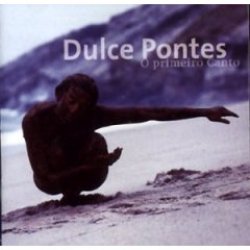Dulce Pontes - O Primeiro Canto (1999)
Dulce Pontes - O Primeiro Canto (1999)

1. Alma Guerreira (Fogo)/Warrior Soul (Fire) 2. Fado Mae Fado Mother 3. Tirioni 4. O Primeiro Canto (Dedicado a Jose Afonso) First Canto play 5. O que For Ha de Ser (Ar) (What Will Be Will Be (Air) 6. Modinha das Saias (A Tale of Skirts) 7. Garca Perdida (Lost Heron) 8. Velha Chica (Old Chica) 9. Ai Solidom 10. Suite da Terra (Earth Suite) play 11. E Tao Grande O Alentejo (It's So Big the Alentejo ) 12. Patio dos Amores (Lovers' Lane) 13. Porto de Magoas (Port of Sorrows) 14. Ondeia (Agua/Water) Dulce Pontes - Piano, Vocals, Vocals (Background) Leonardo Amuedo - Bass, Guitar, Guitar (Acoustic) Waldemar Bastos - Guitar, Guitar (Acoustic) Bernardo Bessler - Violin Wim Both - Trumpet Eddie Conard - Percussion Jesse Cook Guitar, Guitar (Acoustic) Ricardo Cruz - Bass, Bass (Acoustic), Double Bass Angelo Dell'Orto - Violin Joao Ferreira - Djembe, Drums, Percussion, Rainstick, Triangle, Water Effects, Xequere Trilok Gurtu - Drums, Effects, Percussion, Tabla, Vocals, Voices Phillip Kolb - Clarinet Jaques Morelenbaum - Cello Myrdhin - Celtic Harp, Harp Anders Norudde - Bagpipes, Flute, Overtone Flute, Swedish Bagpipes Jan Oosting - Trombone Luis Pontes - Guitar, Guitar (Acoustic) Arlia de Ruiter - Conductor Jelle Schouten - Trumpet Wayne Shorter - Sax (Soprano), Sax (Tenor), Saxophone António Pinheiro da Silva - Flute Justin Vali - Valiha
Armed with a tape recorder, Portuguese chanteuse Dulce Pontes wandered her native country collecting sonic inspiration for her fifth and finest recording, O Primeiro Canto. Deeply influenced by fado, contemporary, and traditional folk song, Pontes approached this recording nakedly, distilling its sound to that of strictly acoustic accompaniment, a bold move which allows her superbly crystalline vocals to weave the album's through-line. Far more enamored with passion and tactility rather than technique, Pontes organically creates a holistic emotional posture that is malleable, romantic, and sensually awake, suffering not from lack of finesse. Pontes is in possession of a remarkably facile gift: a voice which rings true with each gorgeously stunning note. ---Paige La Grone
Dulce Pontes is a Portuguese musician, songwriter and singer who writes and performs in many music styles, including pop, folk, fado and classical music. Her songs contributed to the 1990s revival of Portuguese urban folk music called fado. Blessed with a powerful and dramatic voice, she is one of the most famous and respected Portuguese artists. She is constantly searching for new tones, the sound of new instruments, however strange they may appear or however much they have fallen into disuse - even when they only exist in museums. She experiments with other voices next to her own, other tongues, other popular song traditions, and if we ask her to, she can even sing in Berber. To accompany her in her recordings she goes to the most diverse of places to find musicians that she admires and who she once heard play and has never forgotten. With tape recorder in hand, she traveled all over Portugal, to gather sources for her new album, “O Primeiro Canto”. For her, singing is a form of freedom, which does not fit within countries or frontiers of any type.
Dulce José Silva Pontes (Montijo, 8 de Abril de 1969) é uma das cantoras portuguesas mais populares e reconhecidas internacionalmente. Canta canções pop, música tradicional portuguesa (fado e folclore incluído), bem como música clássica. Costuma definir-se como uma artista da world music. Também compõe alguns dos temas que canta. A sua actividade artística contribuiu para o renascimento do fado nos anos noventa do século passado. Dulce distingue-se principalmente pela sua voz, que é versátil, dramática e com uma capacidade invulgar de transmitir emoções. É uma soprano dramática com uma voz potente, versátil e penetrante. É considerada uma das melhores artistas dentro do panorama musical português. Já actuou em palcos como o Carnegie Hall e ao lado de nomes como Enio Morricone, Andrea Bocelli e José Carreras. O disco O Primeiro Canto foi lançado em 1999. A crítica considerou-o o melhor, e também o mais ambicioso e difícil na carreira da Dulce. Neste disco Dulce confirma que está seriamente interessada em ser uma artista da world music. Em O Primeiro Canto Dulce introduz elementos do jazz (o álbum contou com a colaboração da Maria João) e opta pela sonoridade acústica. Dá nova vida a antigas tradições musicais da Península Ibérica (canta não só em português, mas também em galego e mirandês), redescobre melodias e instrumentos há muito esquecidos.
Dulce Pontes (ur. 8 kwietnia 1969 w Montijo koło Lizbony) – portugalska artystka. Pisze i wykonuje głównie piosenki popowe i folkowe, nie stroni również od muzyki klasycznej. Sama definiuje się zazwyczaj jako artystka world music. Jej twórczość przyczyniła się do odrodzenia w latach dziewięćdziesiątych XX wieku portugalskiej miejskiej muzyki folkowej, znanej jako fado. Obdarzona silnym, dramatycznym i łatwo przekazującym emocje głosem, Dulce jest jedną z najsłynniejszych i najbardziej cenionych portugalskich wokalistek. W 1999 r. wydany został album O Primeiro Canto (Pierwszy Śpiew). Krytycy zgodnie uznali go za najlepszy i najambitniejszy album Dulce. Nowości pojawiające się na tym albumie to elementy jazzu (w nagraniu albumu uczestniczyła ceniona portugalska wokalistka jazzowa Maria João) oraz fakt, że album ten jest prawie w całości akustyczny. Wiele z utworów na nim się znajdujących zostało napisanych przez Dulce. W poszukiwaniu materiału i inspiracji do tego albumu artystka zjeździła wiejskie regiony Portugalii, odszukując i wydobywając z zapomnienia stare tradycyjne melodie i instrumenty. Śpiewa na tym albumie nie tylko po portugalsku, ale też w innych językach iberyjskich – galicyjskim i mirandyjskim.
download (mp3 @192 kbs):
uploaded yandex 4shared mega mediafire zalivalka cloudmailru oboom uplea
Zmieniony (Poniedziałek, 17 Sierpień 2015 20:48)








